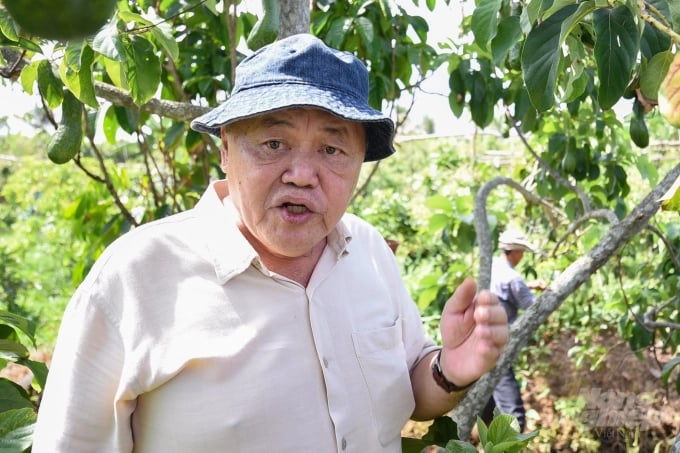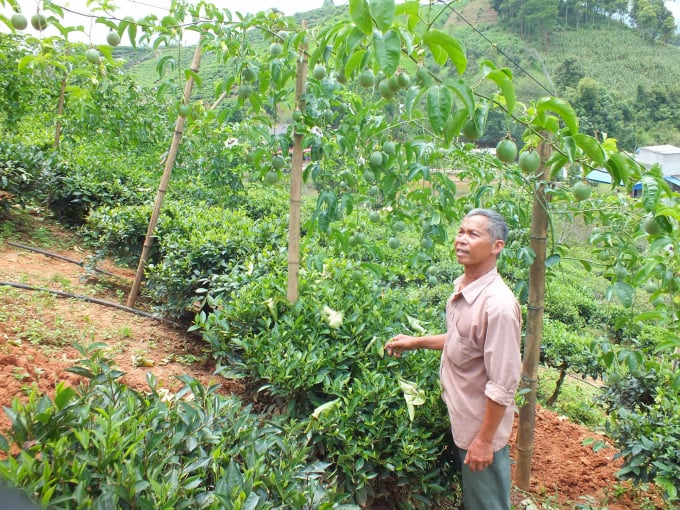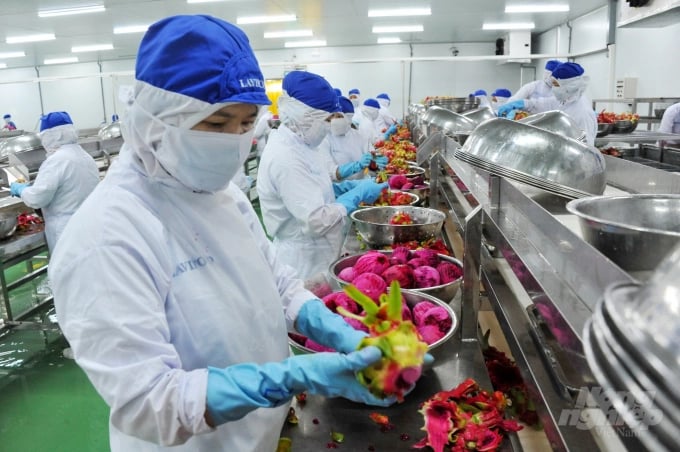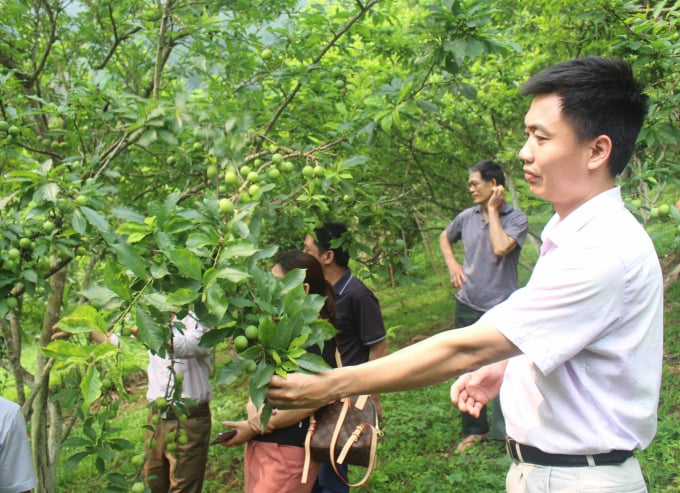June 17, 2025 | 18:28 GMT +7
June 17, 2025 | 18:28 GMT +7
Hotline: 0913.378.918
June 17, 2025 | 18:28 GMT +7
Hotline: 0913.378.918

Assoc. Prof. Dr. Nguyen Minh Chau visited farmers in Cho Lach, Ben Tre. Photo: TD.
Invited by Vietnam Agriculture Newspaper to write comments, I joined with the hope that many production problems would be solved thanks to the participation of research institutes. I will present the operating experience of a research institute in New Zealand.
It would probably be difficult to get enough funding for institutes to do research for every crop. Therefore, the MARD should come to terms with the provinces about which trees will be funded by the Ministry, and which trees will be handled by the provinces.
For example, the Central Highlands and the Northwest have avocados that are both unique and have great potential, so the provinces in these two regions should take care of their own research funding. Without a clear duty division, I think the avocado tree problems in these two regions will not be clear of who will take care of the funding to solve the problems to their full extent.
Many problems on avocado trees that no one knows how long will it take to be solved include: Which rootstock to avoid avocado phytophthora, where to buy good and disease-free seedlings, is the current planting technique correct, how to fertilize to achieve a high fat level, when to harvest, and how to ripen so that when consumers buying and eating it will achieve the same high quality as avocados in exporting countries...
When the roles are clearly defined, in addition to solving the funding problem, regarding the problems on avocado trees, localities will surely know better than the Ministry of Agriculture and Rural Development about what needs to be solved for their production.

Farmers in Moc Chau (Son La) harvest avocados. This is a very potential crop of Son La. Photo: Le Ben.
Thus, the division of the roles not only contributes to solving the problem of funding for research but also solving the problem that the producer has been and is in dire need of answers, thereby quickly making use of the still huge potential of avocado trees in these two lands if there are sciences to guide the people.
The same goes for passion fruit trees in the Central Highlands and Northwest. If there is a roles division, the problems on passion fruit trees such as: disease-free seedlings, sustainable planting techniques as demonstrated in Taiwan, from harvesting and processing to producing many products, they solve it very well.
Due to the lack of roles division, the disease-free passion fruit seedlings for growers still are nowhere to be found, only "disease-free plants" according to the advertisement, when bought and planted, after a short time, many viral diseases will soon be revealed. Then there’s the technique of growing passion fruit, also having no one to guide in the direction of sustainability, so farmers in the Central Highlands only canceled it after having planted it for 1.5 - 2 years. While in Taiwan, every 1 year after planting, they destroy the entire production area to replant with disease-free seedlings.
By doing the same as Taiwan, the passion fruit production of farmers will achieve more Grade 1, the new production efficiency will be higher, be the "agricultural economy" as what the Minister of Agriculture and Rural Development Le Minh Hoan. said, rather than working hard to achieve very high output, but the income is very low like the current-applied technology. And farmers are still very poor, although still achieving high productivity, 1.5 - 2 times higher than in Taiwan, but the number of fruits reaching Grade 1 like them is much lower.

Passion fruit is a new and potential crop in the Central Highlands and Northwest, but there has not been any orderly investment in research, especially in the disease prevention phase and acquiring disease-free varieties. Photo: Le Ben.
Many business issues currently need the institutes’ involvement, such as the business groups that engage in large production at home country and abroad (Laos, Cambodia...); fruit export enterprises.
Institutes should, at least once a year, organize the introduction of technical advances to enterprises. As experienced in the Plant & Food Institute of New Zealand, they have a strong bond with large fruit export companies, not only assigned the companies the right to exploit the institute’s new varieties, but also issues related to post-harvest preservation on export fruits, ensuring that after reaching the market, they are still fresh and delicious.
Thanks to the cooperation, the Plant & Food Institute has both added income and added jobs for research scientists.
I see research institutes in New Zealand, such as the Plant & Food Institute, being autonomous in everything, which is different from the way things are currently being done in our research institutes. Perhaps thanks to that, scientists at the Plant & Food Institute are passionate about their work and have a high living conditions.
This is how the Plant & Food Institute operates: They hire a director (CEO) to run the medical institute like a private company. Their annual budget is huge thanks to royalties on new varieties. This funding comes from the cooperation in technology transfer for fruit exporting companies, and the funding also comes from supporting developing countries like Vietnam (The New Zealand government will finance them when they come to help Vietnam).
Thanks to operating as a company, Plant & Food Institute is allowed to contract with any good scientists, or cancel contracts with any staff. In our case, it's different, due to many regulations, institutes cannot attract talented people and pay high salaries, or reduce staff like their side! This makes it very difficult to change the apparatus at large institutes, which have existed for many years, because the mechanism has already approved such payroll for the institutes.

In accordance with Assoc. Prof. Dr. Nguyen Minh Chau, it is necessary to increase autonomy so that institutes have mechanisms for cooperation and technology transfer with businesses, thereby increasing revenue and improving the life of scientific staff. Photo: Ba Thang.
As a scientist, creative freedom is a big deal. Everyone wants to be able to do what they are passionate about. Not being creative, having to follow the approved plan, is almost the same as forcing scientists to do administrative work, just ensuring “8 hours of gold” as required by the State is fine.
How to make scientists not work in 8 hours, but will also keep thinking all the time at home, only then will science develop. To do so, it is necessary to encourage and create maximum conditions for them to work in the direction they love. And the more things are done with good results, the higher the income will be.
Currently, I heard that officials do not want to do more international cooperation projects, or projects with other provinces, because if they work on 1 or 2 more topics/projects, then in a day they can only get one salary source, only 8 hours.
Consequently, at the end of the year, the money is left over, because they cannot receive more. Perhaps this should be reconsidered, otherwise, no one will want to participate in solving provincial problems or upgrading technology through cooperation with international organizations. So, as for the question about the current financial law should be reconsidered or not, I think it should.
I have presented how the operation of a research institute in New Zealand is very different from the way of Vietnam. They operate the institute like a company, hire a CEO to run it, what farmers/businesses need, what exporters need, all are very positive to be involved, thereby creating jobs for scientists. In our case, we are currently entangled with the budget law, and the above payroll has been assigned, so it has not been as effective and dynamic as they do.

Assoc.Prof.Dr. Nguyen Minh Chau suggested that institutes should be piloted for autonomy, firstly in terms of payroll and selection of research issues. Photo: Ba Thang.
So, should a few institutes be piloted, through registration, to see if the spirit for engrossed research would increase, the current too low income would be improved? I think changes should be made, so that at least most of the leading scientists of the institutes would be absorbed in their work.
Therefore, the institutes should be autonomous, in terms of payroll first of all, in choosing research issues, following the model of New Zealand institutions. Regarding funding, they should be autonomous in at least 30% of the funding for research currently being granted to institutes to quickly solve production problems without having to wait for permission from the MARD.
Of course, it is advisable to encourage to do more jobs, to participate in solving the requirements of localities and international cooperation to increase income.

(VAN) The UNESCO Global Geopark revalidation of Non nuoc Cao Bang and the transition to a two-tier administrative model are presently undergoing a pivotal moment in Cao Bang, the northernmost province of Vietnam.
/2025/06/13/5330-2-004539_953.jpg)
(VAN) Changing policy mindset and removing investment barriers are urgent requirements to open up new development space for enterprises in the agricultural sector.

(VAN) The areas include the restoration of five million hectares of marine ecosystems.

(VAN) Dr. Le Van Nguyen, Director of the Institute of E-Commerce Management (ECM), emphasizes the potential for green development through the cultivation of fruit trees, particularly in provinces such as Son La.

(VAN) VAAS and numerous Vietnamese enterprises have signed cooperation agreements with Japanese partners to promote agricultural technology and trade connectivity.
/2025/05/29/5625-12-214801_567.jpg)
(VAN) Provincial mergers in the Mekong Delta promise to streamline administration, expand inter-provincial raw material areas, and foster close linkages in agricultural value chains, benefiting both businesses and cooperatives.

(VAN) Merging Mekong Delta provinces contributes to the expansion of agricultural raw material areas, addressing previous constraints caused by provincial boundaries. Additionally, this expansion will reduce costs and strengthen linkages between businesses, cooperatives, and farmers.